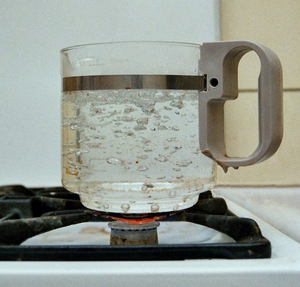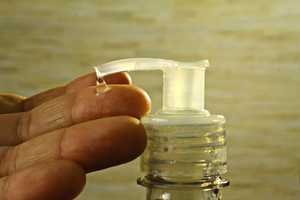Difference between revisions of "Evaporating"
(→About Evaporating) |
|||
| Line 47: | Line 47: | ||
| style="height:20px; width:600px; text-align:left;" |The [[particle]]s in the [[liquid]] move faster until they are moving fast enough that they break the [[bond]]s holding the [[particle]]s together. The [[particle]]s become free to move anywhere which makes the [[State of Matter|state]] a [[gas]]. | | style="height:20px; width:600px; text-align:left;" |The [[particle]]s in the [[liquid]] move faster until they are moving fast enough that they break the [[bond]]s holding the [[particle]]s together. The [[particle]]s become free to move anywhere which makes the [[State of Matter|state]] a [[gas]]. | ||
|} | |} | ||
| + | |||
| + | ==Key Stage 4== | ||
| + | ===Meaning=== | ||
| + | [[Evaporating]] is an [[endothermic]] [[Physical Change|physical change]] in which the [[particle]]s on the surface of a [[liquid]] are able to escape the [[liquid]] to become part of a gas. | ||
| + | |||
| + | ===About Evaporating=== | ||
| + | '''Evaporating''' is different from [[boiling]] because: | ||
| + | #'''Evaporation''' happens from the surface of the [[liquid]]. | ||
| + | #'''Evaporation''' can happen at [[temperature]]s below the [[Boiling Point|boiling point]] of the [[liquid]]. | ||
| + | |||
| + | : [[Evaporating]] happens when some [[particle]]s at the surface of a [[liquid]] have enough [[energy]] to escape the [[bond]]s holding the [[particle]]s together in the [[liquid]]. | ||
| + | : '''Evaporation''' is an [[endothermic]] process, which means it needs to [[Absorb (Physics)|absorb]] [[energy]] to take place. When [[liquid]]s '''evaporate''' the [[temperature]] of the [[liquid]] decreases as the [[energy]] is taken away by the [[particle]]s escaping the [[liquid]]. | ||
| + | : [[Evaporating]] is a [[Physical Change|physical change]], which means it is [[Reversible Changes|reversible]] and does not produce new [[chemical]]s. | ||
Revision as of 10:15, 27 December 2018
Contents
Key Stage 2
Meaning
Evaporating is when a liquid turns into a gas.
- Noun: Evaporation
- Verb: To evaporate
- Present Participle: Evaporating
| A liquid will evaporate to become a gas. |
About Evaporating
- Heating a liquid will cause it to evaporate into a gas.
- Evaporation is a reversible process. When a liquid evaporates into a gas you can condense that gas back into a liquid.
- You may have seen these evaporating:
- Water
- Hand Gel
Examples
| When water is boiling the liquid evaporates turning into a gas. Eventually all the liquid will be gone and the room will be filled with water vapour. | When you use Hand Gel the liquid quickly evaporates from your hands so you don't need to dry them. |
Key Stage 3
Meaning
Evaporating is an endothermic process in which a liquid turns into a gas.
About Evaporating
- Evaporation is a reversible process. When a liquid evaporates into a gas you can condense that gas back into a liquid.
- Heating a liquid will cause it to evaporate more quickly into a gas.
| The particles in the liquid move faster until they are moving fast enough that they break the bonds holding the particles together. The particles become free to move anywhere which makes the state a gas. |
Key Stage 4
Meaning
Evaporating is an endothermic physical change in which the particles on the surface of a liquid are able to escape the liquid to become part of a gas.
About Evaporating
Evaporating is different from boiling because:
- Evaporation happens from the surface of the liquid.
- Evaporation can happen at temperatures below the boiling point of the liquid.
- Evaporating happens when some particles at the surface of a liquid have enough energy to escape the bonds holding the particles together in the liquid.
- Evaporation is an endothermic process, which means it needs to absorb energy to take place. When liquids evaporate the temperature of the liquid decreases as the energy is taken away by the particles escaping the liquid.
- Evaporating is a physical change, which means it is reversible and does not produce new chemicals.



